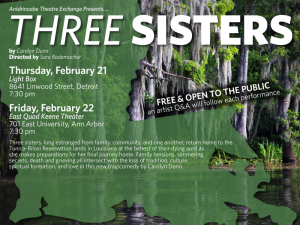Anishinaabe Theatre Exchange Residency | Carolyn Dunn Public Talk

- Dr. Carolyn Dunn, scholar, poet, and playwright.

Scholar, poet and playwright Dr. Carolyn Dunn will lecture on the aesthetics of Native and Indigenous Theater. Dunn was born in Southern California and is of Cherokee, Muscogee Creek, Seminole, Cajun, French Creole, and Tunica-Biloxi descent. She earned a BA from Humboldt State University, an MA from UCLA, and a PhD from the University of Southern California. Her collections of poetry include Outfoxing Coyote (2001) and Echolocation: Poems and Stories from Indian Country L.A. (2013). She has edited the anthologies Through the Eye of the Deer (1999) and, with Paula Gunn Allen, Hozho: Walking in Beauty: Native American Stories of Inspiration, Humor, and Life (2001). Dunn is the coauthor, with Ari Berk, of the nonfiction book Coyote Speaks: Wonders of the Native American World (2008). Her play The Frybread Queen was produced by the Montana Repertory Theater in Missoula, Montana, and Native Voices at the Autry in Los Angeles.
Dunn’s scholarly work focuses on American Indian women’s literature and American Indian identity. She has taught at Humboldt State University, Four Winds Indian School, and California Polytechnic State University. A founding director of the American Indian Theatre Collective, she is also a member of the female Native American drum group the Mankillers. She is director of the American Indian Resource Center at UC Santa Cruz.
All events are free and open to the public. Visit www.lsa.umich.edu/world-performance for more info.
If you are a person with a disability who requires an accommodation to participate in this event, please contact Center for World Performance Studies, at 734-936-2777, at least one week in advance of this event. Please be aware that advance notice is necessary as some accommodations may require more time for the University to arrange.
This residency is co-sponsored by the U-M Residential College, CEW+, Institute for Research on Women & Gender, SMTD Department of Theatre & Drama, Institute for Humanities, SMTD Office of Diversity, Equity & Inclusion and Department of American Culture.
